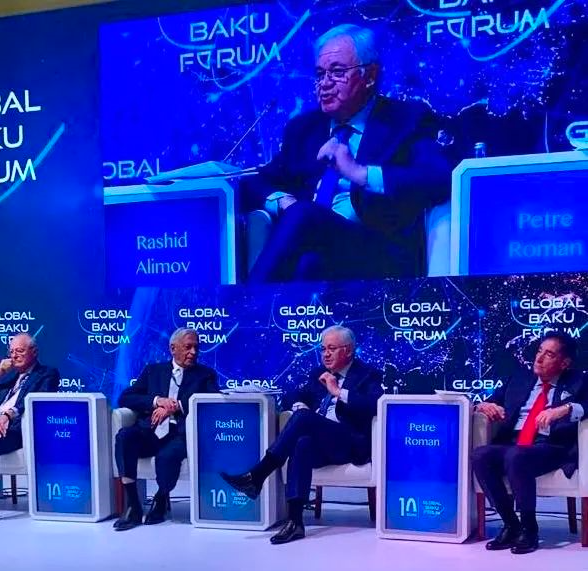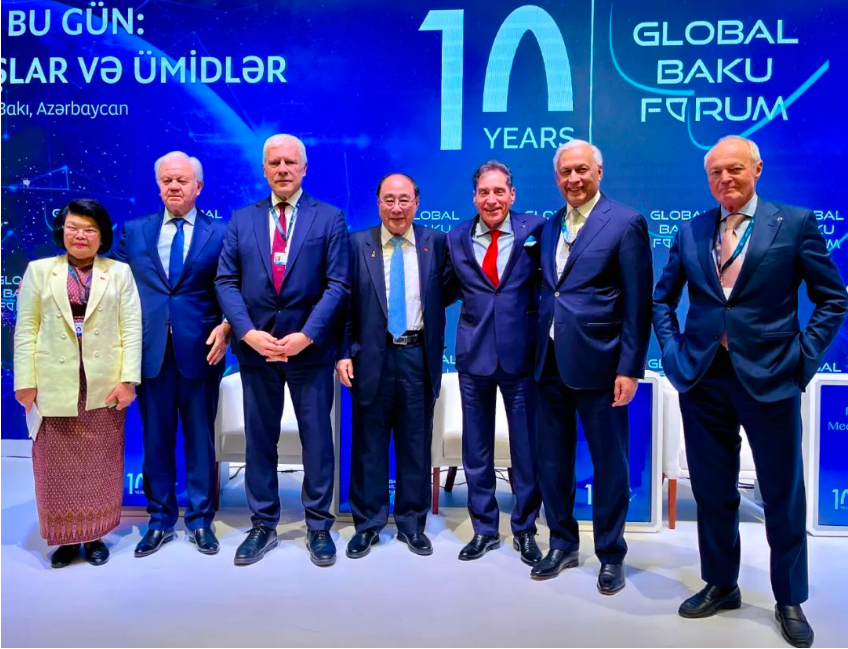From March 9 to 11, 2023, Dr. Rashid Alimov participated in the X Global Baku Forum, and delivered a speech at the Special Panel "China's Role for Global Development and Security."

Abstracts of the speech are as below:
The topic of our discussion is very extensive. China has been and remains the engine of global economic development, as a permanent member of the UN Security Council, China plays an important role in maintaining peace and security in the world.
Let me focus on the relations between China and the countries of Central Asia. They reflect China's role in global development and security like a mirror.

A year ago, China and the countries of Central Asia celebrated the 30th anniversary of the establishment of diplomatic relations.
According to all sides, this road has been covered in three decades, which is equal to a century. Relations between the countries have reached the level of a comprehensive strategic partnership. At present, cooperation between China and the five countries of Central Asia covers over 100 regions.
Relations between China and the countries of Central Asia are based on respect for the principles of state sovereignty and territorial integrity, non-interference in each other's internal affairs and prevention of any activity on their territory that contradicts these principles.
China and the countries of Central Asia are developing countries, their key interests largely coincide, and their development strategies have much in common. China's achievements in reform and socio-economic development, poverty alleviation and new technologies provide an excellent opportunity for the development of Central Asian countries.

At the same time, the parties respect the right of each state to choose its own path of development, take into account historical experience and national characteristics, create favorable conditions for the development of each other and strive to ensure that economic cooperation is mutually beneficial and complementary. Good neighborliness and geographical proximity contribute to this.
Starting from zero, China and the states of Central Asia have demonstrated a high level of attraction of national economies. Since 2000, having solved the issues of transport interconnection, the parties have been rapidly increasing bilateral trade, which is mainly carried out through 8 checkpoints.
According to Chinese Customs data, in 2001, the trade turnover of the Central Asian countries with China amounted to $1.5 billion and increased by more than 25 times over the next twenty years. China is also becoming one of the important export destinations for Central Asian countries. Since 2016, it has grown by 43%. Moreover, in 2020 this figure amounted to $16.4 billion. For example, only Kazakhstan exported more than 20 types of agricultural and livestock products to China.
China has become one of the key sources of direct investment in the economies of the Central Asian countries, the total volume of which at the end of 2020 approached $40 billion. Investment growth is directly related to Chinese companies that successfully operate in the region both as part of joint ventures and their own 100% capital. Their number at the end of 2021 reached 7.7 thousand. It is important that Chinese capital comes to the countries of Central Asia along with new technologies and the best solutions in the field of agriculture and water management, industry and engineering, which helps to accelerate the transition to new industrial tracks, jointly build a digital and "green" economy.

Trade between China and Central Asian countries is expected to reach $70 billion by 2030. This will be facilitated by the Dialogue Mechanism for Cooperation in the Field of Electronic Commerce, the Forum for Industrial and Investment Cooperation, as well as the Forum for Trade and Economic Cooperation between the PRC and the countries of Central Asia.
China also announced the provision of gratuitous assistance in the amount of $500 million to the Central Asian states in the next 3 years for the implementation of socially significant projects. An agreement was reached on wide access to quality goods and agricultural products of Central Asia to the huge domestic market of China.
This year marks the 10th anniversary of the Chinese Belt and Road Initiative. Let me remind you that the Initiative was put forward by Chinese President Xi Jinping in September 2013 in Kazakhstan. As you know, the countries of Central Asia do not have access to the sea. According to the World Bank, the Central Asian economies are among the least "connected" economies in the world. An accelerated and qualitative improvement in transport connectivity between the countries of Central Asia and their neighbors, including China, will help increase the region's GDP by 15%. This is an assessment of the World Bank experts.
Thanks to the Belt and Road, the countries of Central Asia now play an important role as an Asia-Europe intercontinental land bridge.
——————————————